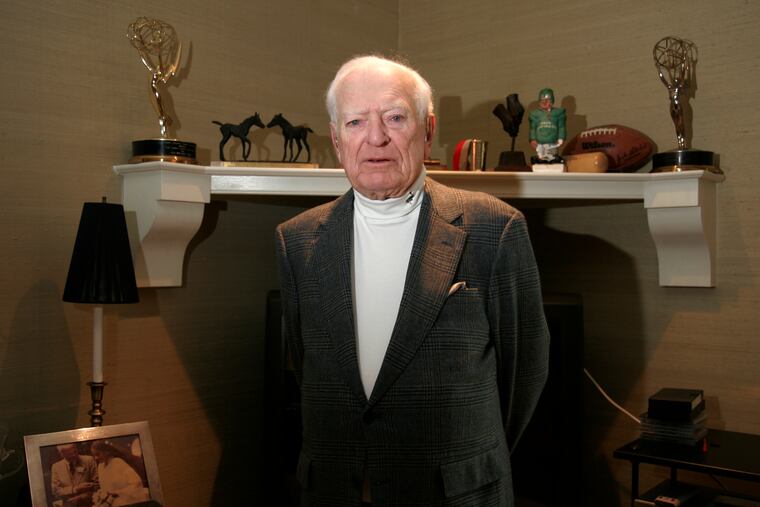Jack Whitaker: A Philly broadcaster who headed west before becoming a sports legend
Whitaker, who died Sunday at 95, introduced elegance and erudition into the genre. His work was infused by a broad vocabulary, a tweedy wardrobe and a thoughtful demeanor.

Jack Whitaker was a pioneer, so maybe it was fitting that his TV career dawned in a makeshift cowboy town on the outskirts of Philadelphia.
As one of sports broadcasting’s first and best essayists, Whitaker, who died Sunday at 95, introduced elegance and erudition into the genre. His work was infused by a broad vocabulary, a tweedy wardrobe, and a thoughtful demeanor.
But while he added a professorial air to decades’ worth of telecasts from Super Bowls, Masters, Olympics and Kentucky Derbys, the Germantown native never forgot that he once stood before a camera dressed like a gunslinger.
“It wasn’t my finest hour,” Whitaker told the Inquirer in 2007, “but you did what you had to do and you hoped it made you better.”
That forgotten TV chapter took place in the early 1950s, not long after the St. Joseph’s graduate had transitioned from radio.
A utility man at WCAU-TV, he did the weather, a minute or two of scores during John Facenda’s nightly 15-minute newscast, co-hosted the “Tee Time” talk show at Bala Golf Club, and occasionally acted in “Action in the Afternoon,” a daily western the station produced in the backyard of its Bala Cynwyd offices.
“Once in a while, I’d be out there in the hot sun, wearing a cowboy suit, with a gun strapped around my waist and I’d wonder, `What have I gotten myself into?’ ” Whitaker said.
That he eventually landed in television was also a surprise. The North Catholic alum grew up dreaming of a career as a radio sportscaster.
“I was crazy about radio,” he once said. “I couldn’t get enough of [local baseball announcers] Bill Dyer, By Saam, all of them.”
He enlisted in the Army during World War II, landed on Normandy Beach three days after D-Day and, two years after his 1945 discharge, graduated from St. Joe’s.
Whitaker found a job with a tiny, 250-watt radio station in Pottsville, WPAM. It wasn’t as glamorous as he’d imagined. He’d occasionally read news headlines, but more frequently he was doing ads or interviewing local businessmen.
But while watching the new medium’s coverage of the 1950 U.S. Open at Merion, he decided his future was in TV.
WFIL-TV in his hometown hired him. He moved on to WCAU and after CBS purchased that station from the Evening Bulletin in 1957, someone at the network noticed Whitaker.
He began commuting to New York whenever CBS needed him. By 1961, he was announcing Eagles games. He was picked to host the “CBS Sports Spectacular,” an anthology show that was the network’s answer to ABC’s popular “Wide World of Sports” – a show, incidentally, hosted by fellow Philadelphian Jim McKay.
Then, like one of the thoroughbreds in the sport he grew to love most of all, Whitaker was off and running.
He was part of the team that worked the first Super Bowl, in 1967. In 1973, he was there to lend perspective to Secretariat’s incredible 31-length victory in the Belmont Stakes to win the Triple Crown.
“That was probably the most dominating performance by any athlete I’d ever seen,” he said. “People who saw it were crying.”
If that was a highlight, an inadvertent lowlight had happened in 1966. That year he was removed from the network’s Masters coverage for making the mistake – a mistake only among the supercilious organizers of that sometimes unbearably stuffy tournament – of referring to an Augusta National crowd as “a mob.”
“I didn’t feel good about it,” Whitaker said. “The whole thing smacked of a B-movie.”
Though he was an outstanding play-by-play man, the essays became his niche and, attempting to enhance its expanding Olympic coverage, the reason that in 1982 ABC stole him away from CBS.
“When I first met Jack … I felt like I’d been introduced to Ernest Hemingway,” CBS’ Jim Nantz said Sunday. “I grew up watching him deliver contemplative and contextual prose with his famous short essays, bringing class and dignity to his industry.”
St. Joseph’s awarded Whitaker an honorary degree in 1979 and he was inducted into the Sports Broadcasting Hall of Fame in 2012.
“There will never be another Jack Whitaker in sports broadcasting,” said CBS Sports chairman Sean McManus, McKay’s son.
And there likely won’t be one in afternoon westerns, either.